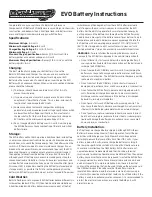
74
ANR26650
M1-
B
Table 21 – ANR26650
M1-
B Max continuous charge currents wrt temperature and SOC
Table 22 – ANR26650
M1-
B Max 10s pulse charge currents wrt temperature and SOC
Table 23 – ANR26650
M1-
B Max continuous discharge currents wrt temperature and SOC
Table 24 – ANR26650
M1-
B Max 10s pulse discharge currents wrt temperature and SOC
Temp(°C)
%SOC
0%
10%
20%
30%
40%
50%
60%
70%
80%
90%
100%
85
0
0
0
0
0
0
0
0
0
0
0
65
25
25
25
25
25
25
25
25
25
25
0
30
25
25
25
25
25
25
25
25
25
25
0
25
25
25
25
25
25
25
19
19
19
19
0
15
19
19
19
19
19
19
10
10
10
10
0
10
13
13
13
13
13
13
8
8
8
8
0
0
8
8
8
8
8
8
5
5
5
5
0
-10
5
5
5
5
5
5
5
5
5
5
0
-20
3
3
3
3
3
3
3
3
3
3
0
-30
1
1
1
1
1
1
1
1
1
1
0
-40
0
0
0
0
0
0
0
0
0
0
0
Temp(°C)
%SOC
0%
10%
20%
30%
40%
50%
60%
70%
80%
90%
100%
85
0
0
0
0
0
0
0
0
0
0
0
65
0
40
40
40
40
40
40
40
40
40
40
30
0
40
40
40
40
40
40
40
40
40
40
25
0
40
40
40
40
40
40
40
40
40
40
15
0
40
40
40
40
40
40
40
40
40
40
10
0
36
36
36
36
36
36
36
36
36
36
0
0
22
22
22
22
22
22
22
22
22
22
-10
0
12
12
12
12
12
12
12
12
12
12
-20
0
8
8
8
8
8
8
8
8
8
8
-30
0
3
3
3
3
3
3
3
3
3
3
-40
0
0
0
0
0
0
0
0
0
0
0
Temp(°C)
%SOC
0%
10%
20%
30%
40%
50%
60%
70%
80%
90%
100%
85
0
0
0
0
0
0
0
0
0
0
0
65
0
70
70
70
70
70
70
70
70
70
70
30
0
70
70
70
70
70
70
70
70
70
70
25
0
34
64
70
70
70
70
70
70
70
70
15
0
28
52
70
70
70
70
70
70
70
70
10
0
25
46
64
70
70
70
70
70
70
70
0
0
17
31
46
57
64
70
70
70
70
70
-10
0
8
16
24
32
39
44
48
50
53
53
-20
0
6
10
14
19
23
26
29
31
33
33
-30
0
3
4
5
6
7
9
10
11
13
13
-40
0
0
0
0
0
0
0
0
0
0
0
















































